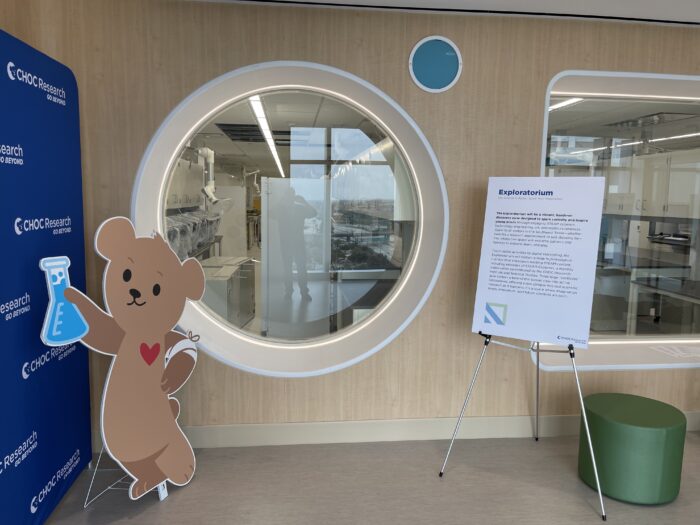There was a palpable sense of excitement — and purpose — at this year’s CHOC (part of Rady Children’s Health) Research Institute Strategy Retreat.
Held annually, the retreat serves as a forum for leaders and collaborators to reflect on progress, share updates, and align on future priorities.
But the 2025 retreat marked a milestone: For the first time, the Orange-based organization welcomed Rady Children’s Hospital-San Diego to the table, signaling the beginning of a new era under the Rady Children’s Health umbrella.
The day was filled with meaningful connection, spirited dialogue, and bold ideas about the future of pediatric research — not only locally, but for the broader pediatric research community.
Dr. Terry Sanger, chief scientific officer in Orange, opened the retreat by underscoring the potential of this growing alliance.
“We have an opportunity to become the place families turn to — no matter where they’re from — when they need answers, and when they need hope for their children,” he said.
Reflecting on the past, planning for the future
Now in its third iteration, the strategic retreat began in 2020 with the creation of a five-year roadmap. A mid-point review in 2023 assessed progress and redefined direction. This year’s focus was on the road to 2030 — envisioning where Research aspires to be and identifying the steps to get there.
Dr. Sandip Godambe, senior vice president and chief medical officer in Orange, reminded participants that research is ultimately a means to improve care — transforming questions into discoveries and translating ideas into real-world impact for children and families.
With Rady officially part of that vision, the retreat’s atmosphere was one of shared purpose and collaborative momentum.

Measuring momentum
Phuong Dao, executive director of the Research Institute, presented compelling data to illustrate the institute’s growth.
Currently, Research oversees more than 621 active studies involving over 3,500 patients. The institute supports 214 principal investigators, 140 employees, 116 interns, and 89 physicians serving as UC Irvine faculty. It also hosts 24 visiting scientists from across the research spectrum.
Phuong highlighted the success of the Chief Scientific Officer (CSO) grant program, launched in 2020, which has helped teams secure competitive federal research funding-often in collaboration with UCI.
To address the growing need for clinical research staff, Rady Children’s recently introduced an internship program for clinical research coordinators (CRCs). Supported by UCI’s Institute for Clinical and Translational Science (ICTS), where Rady Children’s is now a formal pediatric partner, the program is building a pipeline of skilled research professionals.
“It’s exciting to see how far we’ve come,” Phuong said. “And even more exciting to think about what’s next.”

A new home for discovery
A major announcement that generated buzz among attendees was the upcoming expansion of the Research Institute into new space. Beginning in late June, the institute will occupy the ninth floor of the Southwest Tower on the Orange campus — adding 29,000 square feet dedicated to research and innovation.
The new space will feature:
- A fully equipped Center for Clinical Research with exam and consult rooms
- A Human Performance Lab for movement and exercise analysis
- 46 wet lab benches for basic and translational research
- Good manufacturing practice (GMP) clean rooms and a Makers Space
This expansion reflects the institute’s growing ambition and readiness to lead pediatric research into its next chapter.
Research in action
Throughout the day, various teams shared progress on their research initiatives:
- Emergency Department: Dr. Ted Heyming and Research Manager Shelby Shelton discussed studies on pain management, distress, social determinants of health, and pre-hospital care-leveraging nearly 120,000 annual patient visits to generate impactful data.
- Neuroscience Institute: Dr. John Crawford and Virginia Allhusen highlighted the team’s growth from no research portfolio two decades ago to over 50 accepted publications annually. Current research focuses include epilepsy, Down syndrome, hydrocephalus, and movement disorders treated with deep brain stimulation. The team secured 17 new grants last year, including a Department of Defense award.
- Metabolic Disorders & Data Science: Dr. Jose Abdenur and Mei-Hui Wang shared updates on metabolic research, while Louis Ehwerhemuepha spoke about the rapid growth of the Computational and Data Science team.
Defining the path forward
The retreat’s core session, The Path Forward, led by Dr. Sanger, brought focus and urgency to the institute’s long-term strategy. The discussion moved beyond vision statements to the realities of structure, culture, and shared responsibility.
“We owe it to our children to not just care for them, but to discover for them,” Dr. Sanger said. “The questions come from the bedside, and the answers need to return to the bedside.”
This philosophy — what he terms bedside-to-bedside research — calls for deeply integrating research across clinical operations. Since 2020, strategic planning has guided the institute’s development, even through the disruptions of the pandemic. With the mid-plan review complete, Rady Children’s now looks to scale with purpose — recruiting clinician-scientists, fostering interdisciplinary collaboration, and translating research into practice.
Key focus areas include brain health, rare disease treatment, improvement science, and data science, with community-engaged research emerging as a vital component. The inclusion of Rady Children’s in San Diego only broadens the possibilities.
Deepening collaboration
Rady Children’s presence was most visible during the two panel discussions.
The first, Academic Leaders Roundtable: Academic Collaboration & Joint Recruitments, featured Dr. Stephen Kingsmore, president and CEO of the Rady Children’s Institute for Genomic Medicine (RCIGM), alongside Rady colleague Wendy Benson and academic leaders from Chapman University and UCI. Dr. Kingsmore emphasized that while the Rady Children’s Health merger will take time, collaborative efforts-especially involving RCIGM’s expertise in rare disease diagnostics, newborn screening, and data science-can begin within months.
The second panel, Advancing Research Excellence: Education & Training for Investigators, focused on mentorship and research training. Panelists from CHOC and UCI — including Drs. Ashish Chogle, Mustafa Kabeer, Terrie Inder, Daniel Shrey, Chulie Ulloa, and Vince Caiozzo — discussed NIH T32 and K award structures, bridge funding, and mentorship models. Several speakers stressed the need for grant incubators, centralized tools, and a physician-scientist track that rewards research contributions rather than clinical volume.
The conversation underscored a shared vision of Rady Children’s as a national leader in pediatric research-driven by strategic investment, mentorship, and a culture that values discovery.
Building for the future
Dr. Sanger also expressed enthusiasm about Rady Children’s potential leadership in gene and cell therapy, especially as a unified electronic health record and access to over 600,000 genomes could power unprecedented breakthroughs.
Yet even amid optimism, the group addressed the realities of scaling: research infrastructure is expanding-now over 45,000 square feet across three buildings-but resources must be allocated efficiently and transparently. Recruitment and retention of talent will be critical, and partnerships with academic institutions and industry will play a central role.
As one attendee put it during the Q&A:
“Bears are cute — but they’re also powerful.”
The Research Institute aims to embody both traits: welcoming and compassionate, yet driven and uncompromising in its pursuit of answers.
Closing on what matters most
To conclude the retreat, Dr. Sanger returned to the core mission of the Research Institute.
“We owe it to our patients to keep pushing forward. Without research, we lose the ability to imagine better outcomes. And it always starts with just one child.”
That sentiment echoed throughout the day-in every presentation, conversation, and idea shared. Whether in a lab, a clinic, or a classroom, the Research Institute is advancing into a future defined by innovation, collaboration, and an unwavering commitment to the children it serves.

Learn about pediatric research and clinical trials at CHOC




